How Dual Diagnosis Treatment Improves Recovery Outcomes

Understanding Dual Diagnosis Treatment
Dual diagnosis treatment is a critical approach in addressing the complex challenges faced by individuals with co-occurring mental health and substance use disorders. By focusing on both issues simultaneously, this method not only improves recovery outcomes but also reduces the risk of relapse. This article explores how dual diagnosis treatment strategies lead to long-term benefits by integrating mental and physical health care for more comprehensive treatment solutions.
Defining Dual Diagnosis in Mental Health
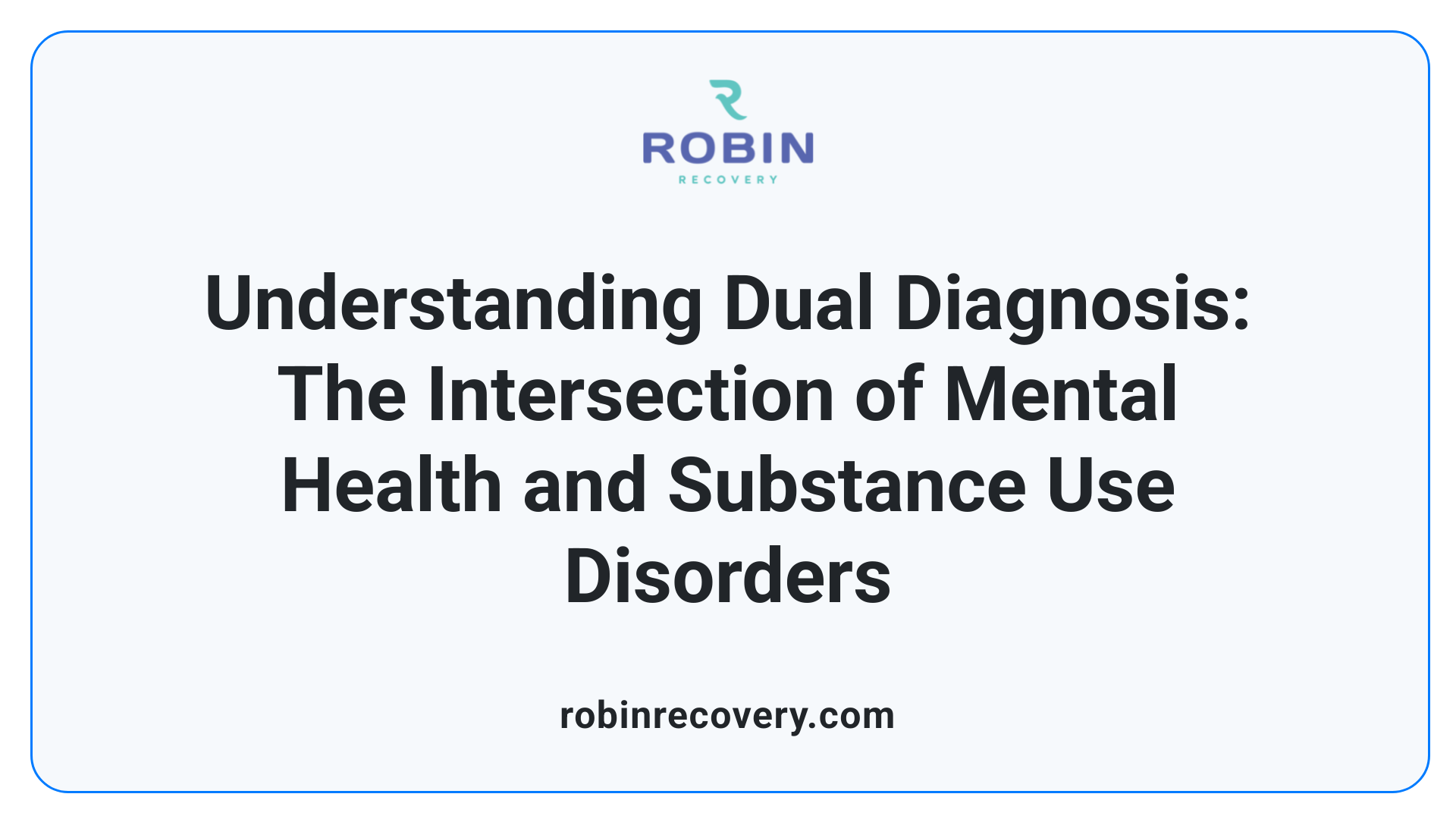
What is dual diagnosis in mental health?
Dual diagnosis in mental health refers to the concurrent presence of a mental disorder and a substance use disorder (SUD), which can involve alcohol or drugs. This condition, also known as comorbidity or co-occurring disorders, is particularly prevalent. Research indicates that around 50% of individuals with severe mental disorders also experience substance abuse issues.
The relationship between these disorders is often complex. For instance, many individuals resort to self-medication, using substances to cope with distressing mental health symptoms. Conversely, substance use can exacerbate or even trigger mental health issues, creating a detrimental cycle that complicates recovery efforts.
Effective treatment requires an integrated approach that addresses both conditions simultaneously. Personalized treatment plans may include a combination of counseling, detoxification, medication management, and support groups to cater to the unique needs of each individual.
Prevalence of co-occurring disorders
According to the Substance Abuse and Mental Health Services Administration (SAMHSA), about 21.5 million adults in the United States are affected by co-occurring disorders. Despite this high prevalence, only a small percentage (7.4%) receive treatment for both conditions. The lack of adequate treatment often stems from misdiagnosis, as symptoms can overlap, posing significant challenges to achieving effective care.
Impact of self-medication
Self-medication represents a common phenomenon among individuals with dual diagnoses. This coping mechanism may provide temporary relief from mental health distress but frequently leads to a cycle of dependency and worsening symptoms. By using substances as a means of coping, individuals risk perpetuating their mental health issues, which highlights the necessity for comprehensive approaches in treatment that address both substance use and underlying psychological conditions.
Aspect Details Importance Integrated Treatment Approach Addresses both mental health and substance use disorders simultaneously. Reduces risk of exacerbation of either disorder; promotes holistic recovery. Co-occurrence Prevalence About 50% of individuals with severe mental disorders also have SUDs. Highlights the need for specialized treatment and support systems. Self-Medication Risks Temporary relief can lead to worsened symptoms and dependency. Underscores the importance of targeted interventions in recovery.
The Importance of Integrated Dual Diagnosis Treatment
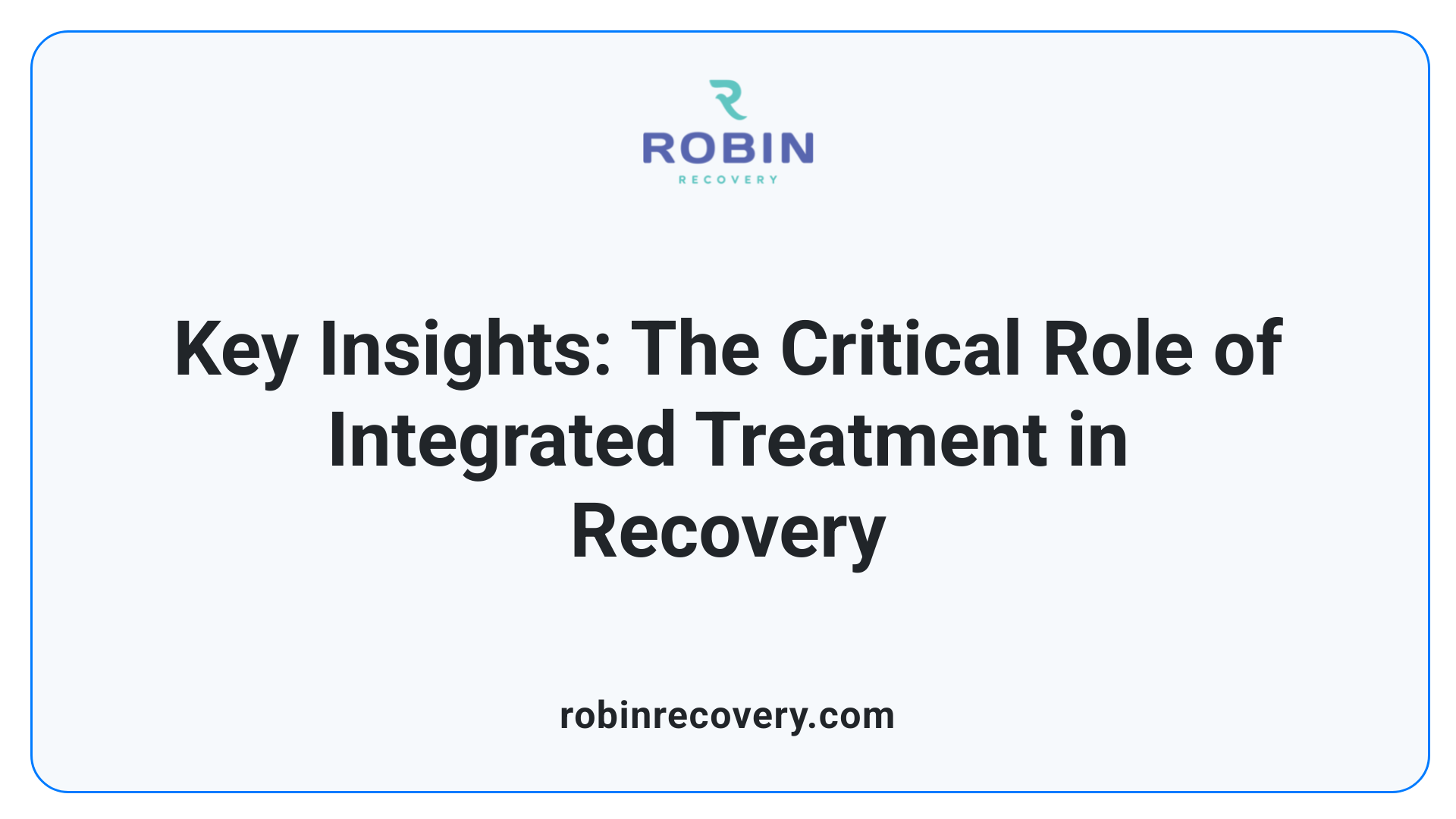
Why is dual diagnosis treatment important?
Dual diagnosis treatment plays a critical role in addressing the simultaneous occurrence of mental health disorders and substance use disorders. Individuals grappling with these overlapping conditions often experience more severe symptoms and a heightened risk of relapse. In the U.S., about 21.5 million adults struggle with co-occurring disorders, yet only a fraction receive appropriate treatment for both conditions.
Effective integrated treatment approaches, incorporating evidence-based therapies like Cognitive Behavioral Therapy (CBT) and Dialectical Behavior Therapy (DBT), are crucial. These therapies focus on managing both mental health and substance use disorders concurrently. Research shows that treating both issues simultaneously significantly improves recovery outcomes compared to treating them separately, helping individuals develop healthier coping strategies.
Relationship between mental health and substance use disorders
The intertwining of mental health issues and substance use disorders creates a cycle that complicates treatment. Common mental health issues that co-occur with addiction include anxiety, depression, and PTSD. When both conditions are not addressed in tandem, each can exacerbate the other, leading to setbacks such as increased cravings or emotional distress. Comprehensive dual diagnosis treatment targets these underlying factors, aiding in more effective long-term recovery.
Integrated approaches and therapies
Integrated treatment plans combine supportive therapy, medication management, and community support to tackle both disorders comprehensively. This approach is designed to reduce hospitalizations, enhance the quality of life, and decrease the risk of relapse. Patients are not only supported in achieving sobriety but also in cultivating stability in their mental health, leading to profound improvements in overall well-being.
Benefits of the Dual Diagnosis Treatment Model
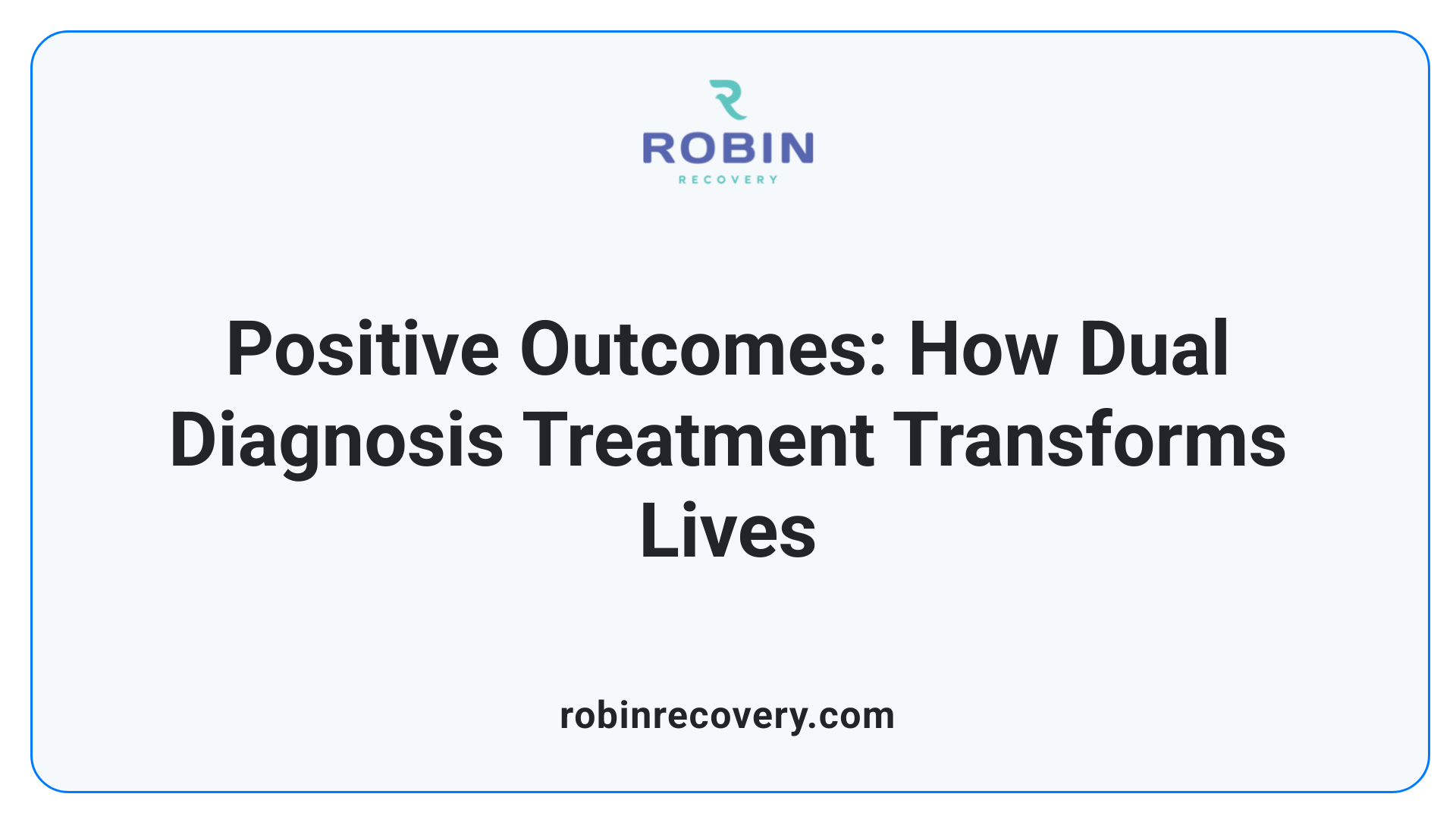
Positive Outcomes from Dual Diagnosis Programs
The dual diagnosis treatment model has shown remarkable success in enhancing recovery outcomes for individuals facing both mental health and substance use disorders. A recent study tracked 130 clients over 10 years, revealing substantial achievements:
- 62.7% of participants effectively managed their schizophrenia symptoms.
- 62.5% were actively achieving remission from substance abuse.
- 56.8% reported living independently—a key indicator of functional recovery.
- 41.4% found competitive employment, showing strides in economic stability.
- 48.9% maintained regular contact with non-substance-abusing peers, fostering positive social networks.
- 58.3% expressed overall life satisfaction, underlining the qualitative benefits of treatment.
These statistics highlight the importance of integrated treatment approaches, which empower individuals to face dual challenges more holistically and effectively.
Improved Recovery and Life Satisfaction
The effectiveness of dual diagnosis treatment is further reflected in its influence on quality of life. By addressing both addiction and mental health issues concurrently, individuals gain:
- Better coping strategies, reducing the likelihood of relapse.
- Enhanced motivation as they witness positive changes in their lives.
- A supportive network, often fostered through group therapy, which contributes to a sense of community.
This model not only fosters long-term recovery but also significantly contributes to overall mental and physical health, equipping individuals with the necessary tools for a healthier, more fulfilling future.
Challenges and Effects of Co-occurring Disorders
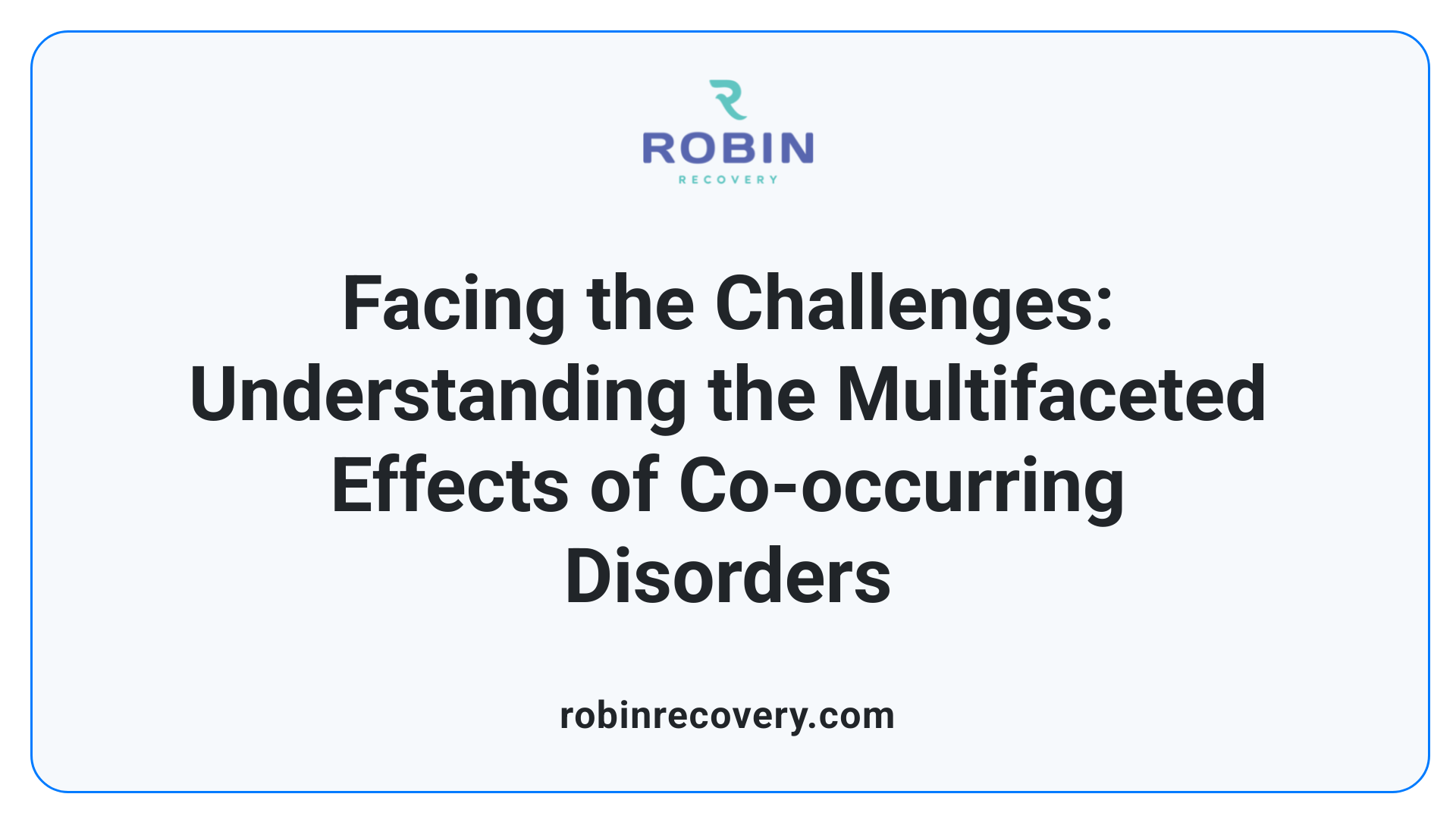
What effects can dual diagnosis have on individuals?
Individuals experiencing co-occurring disorders face significant and multifaceted challenges. Research indicates that around 50% of those with severe mental health issues also contend with substance use problems. This overlap often results in more severe illness trajectories and elevated relapse rates.
The complications associated with dual diagnosis extend beyond mental health and addiction challenges. Individuals in this situation are at a heightened risk of:
- Violence and self-harm: Experiencing increased levels of distress can lead to behavioral issues.
- Suicidal behavior: Mental illness can intensify feelings of hopelessness.
- Infections: Substance misuse often leads to risky behaviors that heighten infection risk.
- Social isolation: The stigma surrounding both mental health and substance use may alienate individuals from their communities.
What unique needs do specific populations have?
Different demographic groups may experience distinct challenges related to dual diagnosis that require specialized attention. For instance, young people may need supportive environments that consider developmental factors. Similarly, Aboriginal communities may necessitate culturally relevant approaches that honor traditional practices and beliefs while addressing mental health and addiction issues. Tailoring treatment options to align with these specific needs is essential for effective recovery, enhancing the overall prognosis for individuals with dual diagnosis.
The Necessity of Concurrent Treatment for Co-occurring Disorders
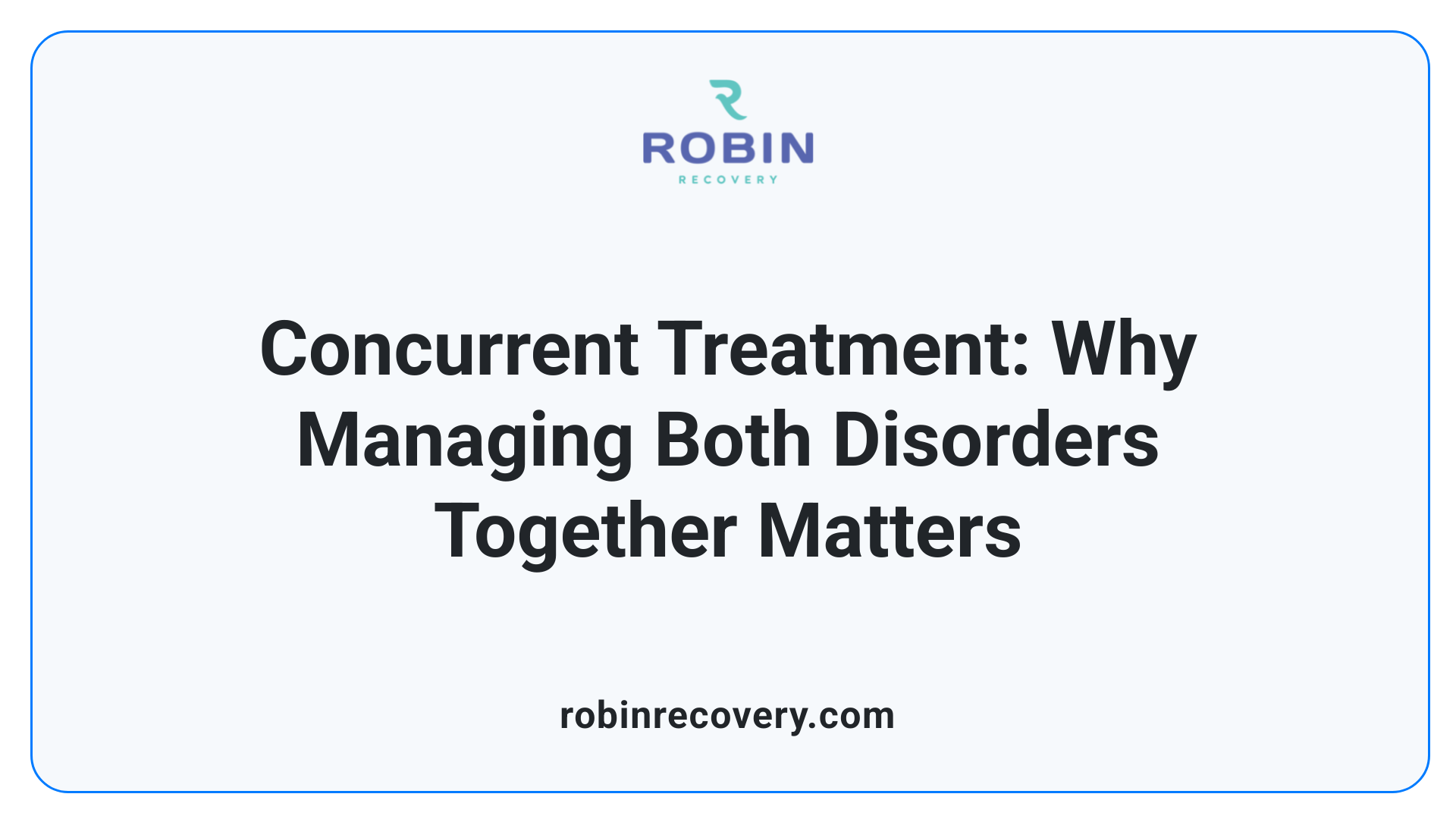
Connection between mental health and substance use disorders
The intricacies of co-occurring disorders lie in the way mental health issues and substance use disorders interrelate. Research shows that approximately 50% of individuals with a substance use disorder will face mental health challenges during their lifetime, and vice versa. This overlap means that neglecting to treat one disorder can lead to worsening symptoms of the other.
In a study assessing the outcomes of individuals with co-occurring schizophrenia and substance use disorders, 62.7% managed to control their schizophrenia symptoms effectively after ten years. This indicates that treating these interconnected challenges simultaneously can lead to significant improvements in mental health.
Importance of treating disorders together
Treating co-occurring disorders together is crucial because these conditions often interact and exacerbate one another, making it difficult for individuals to find relief when treated separately. A dual diagnosis approach addresses both mental health and substance use disorders simultaneously, resulting in better treatment outcomes and lower relapse rates.
For instance, findings from the same study reveal that 62.5% of participants achieved remission from substance abuse after receiving integrated treatment. This evidence suggests that when both disorders are managed concurrently, patients can better understand the interplay between their mental health issues and substance use, leading to more effective coping strategies.
Moreover, integrated treatment fosters an environment that helps reduce stigma, promoting overall well-being. Clients are encouraged to engage fully in their recovery processes, allowing them to develop essential skills necessary for maintaining long-term sobriety. With a structured program, individuals not only foster connections but also learn healthy ways to navigate life's challenges without reverting to substance use.
Understanding Terminology: Dual Diagnosis vs. Co-occurring Disorders
Definitions of Dual Diagnosis and Co-occurring Disorders
Dual diagnosis is the clinical term that describes the simultaneous diagnosis of a mental health disorder along with a substance use disorder (SUD). In contrast, co-occurring disorders encompass a wider range of conditions, as they can involve multiple mental health issues alongside a substance use problem. Essentially, while dual diagnosis pinpoints two specific, separate disorders, co-occurring disorders illustrate a broader, often more entangled relationship between various mental health conditions and substance use.
Importance in Treatment Strategies
Understanding the distinction between these terms is pivotal when devising treatment strategies. Recognizing that individuals labeled with dual diagnosis may require targeted interventions for their specific disorders allows for more tailored treatment plans. This approach can significantly enhance recovery outcomes.
For instance, integrated treatment plans are paramount as they address these interconnected issues simultaneously. By focusing on both conditions at once, practitioners can mitigate the risk of relapse and reinforce healthier coping mechanisms. Their engagement in dual diagnosis care promotes a holistic recovery that considers the intricate relationship between addiction and mental wellness.
How does dual diagnosis differ from the concept of co-occurring disorders?
Dual diagnosis and co-occurring disorders are related concepts but differ in their specificity. Dual diagnosis refers to the simultaneous diagnosis of two distinct conditions, usually one mental health disorder and one substance use disorder (SUD). In contrast, co-occurring disorders encompass a broader range of conditions that can include multiple mental health issues alongside a SUD, indicating a more interconnected relationship. While both conditions are treated together for effective recovery, dual diagnosis focuses on the presence of specific, separate disorders, whereas co-occurring disorders highlight how these issues interact and may exacerbate each other. Understanding these distinctions is crucial for tailoring appropriate treatment strategies for individuals facing these challenges.
The Path Forward in Dual Diagnosis Treatment
Dual diagnosis treatment has proven to be a vital approach in managing the intertwined challenges of mental health disorders and substance use disorders. By offering integrated and personalized care plans, individuals are provided with the necessary tools to navigate their recovery journey more effectively. The data underscores the success of dual diagnosis treatment in fostering long-term sobriety, mental wellness, and overall life satisfaction. As research continues to highlight its benefits, the focus on dual diagnosis treatment will remain crucial in expanding access to comprehensive care and improving recovery outcomes for individuals with co-occurring conditions.
References
- Ten-Year Recovery Outcomes for Clients With Co-Occurring ...
- How a Dual Diagnosis Approach Improves Addiction Rehab Outcomes
- 5 Things to Know About Dual Diagnosis Treatment | Holly Hill Hospital
- Dual Diagnosis: Definition & Treatment - Cleveland Clinic
- Balancing Mental Health and Sobriety with Dual Diagnosis Treatment
- Five Reasons Why Dual Diagnosis Treatment Is Vital in Addiction ...
- Impact of Program Services on Treatment Outcomes of Patients with ...
- Breaking The Stigma - The Importance Of Dual Diagnosis Treatment
- Screening and Treatment of Co-Occurring Disorders - SAMHSA
- How Treatment for Co-Occurring Disorders Improves Recovery
